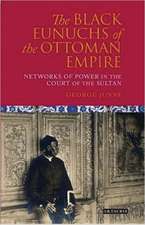Occidentalisms in the Arab World: Ideology and Images of the West in the Egyptian Media
Autor Robbert Wolteringen Limba Engleză Paperback – 28 mar 2017
Preț: 215.43 lei
Preț vechi: 243.59 lei
-12% Nou
Puncte Express: 323
Preț estimativ în valută:
41.24€ • 44.81$ • 34.66£
41.24€ • 44.81$ • 34.66£
Carte disponibilă
Livrare economică 31 martie-14 aprilie
Preluare comenzi: 021 569.72.76
Specificații
ISBN-13: 9781784536923
ISBN-10: 178453692X
Pagini: 224
Dimensiuni: 138 x 216 x 25 mm
Greutate: 0.24 kg
Editura: Bloomsbury Publishing
Colecția I.B.Tauris
Locul publicării:London, United Kingdom
ISBN-10: 178453692X
Pagini: 224
Dimensiuni: 138 x 216 x 25 mm
Greutate: 0.24 kg
Editura: Bloomsbury Publishing
Colecția I.B.Tauris
Locul publicării:London, United Kingdom
Notă biografică
Robbert Woltering received his PhD. at the International Institute for the Study of Islam in the Modern World at Leiden University. He is currently an Assistant Professor in the Department of Arabic Studies at the University of Amsterdam.
Cuprins
1. Introduction2. A History of Occidentalism in Egypt3. Post-Cold War Occidentalism in Egypt4. Examining Contemporary Egyptian Occidentalisms5. Conclusions










